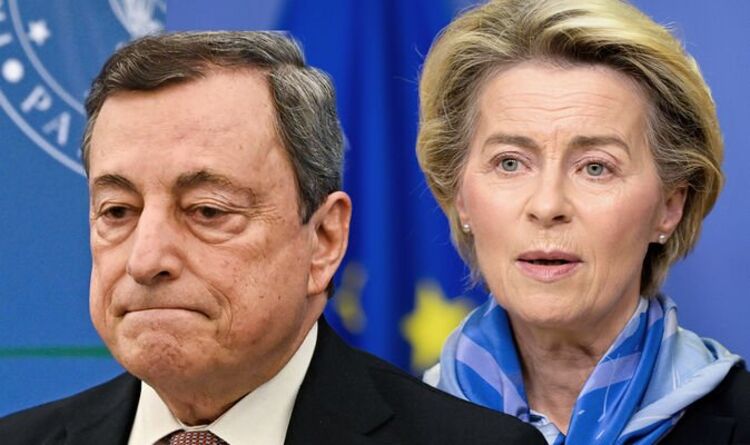Russia: Johnson urged to impose stronger sanctions by Tugendhat
We use your sign-up to provide content in ways you’ve consented to and to improve our understanding of you. This may include adverts from us and 3rd parties based on our understanding. You can unsubscribe at any time. More info
EU leaders will meet in Brussels this evening to discuss further sanctions against Russia after President Vladimir Putin’s decision to attack Ukraine in the early hours of this morning. Russia’s invasion of Ukraine and how the world reacts could have wide-ranging repercussions for the European economy, from rising energy and food prices to economic sanctions that hit trade and investment.
That in turn will affect how quickly the economy gets back on its feet after two years of the coronavirus pandemic and the ability of policy-makers, among them the European Central Bank, to wind down emergency support measures.
Among EU countries, Germany is both Russia’s biggest exporter and importer; France, the Netherlands, Poland, Italy, Belgium all have sizeable trade.
Although Italian officials have so far denied they will attempt to water down tougher sanctions on Russia, some EU officials told Politico that the country, together with Hungary, was being “cautious” when it came to discussing the second round of anti-Moscow measures.
EU officials and diplomats have said some EU countries, including Austria, Hungary and Italy, Russia’s closest allies in the bloc, would prefer more limited sanctions in response to Putin’s move on eastern Ukraine.
Italian Prime Minister Mario Draghi, whose country relies on Russia for much of its gas, told a news conference in Rome that any sanctions should not include energy imports.


The EU is also the largest foreign investor in Russia with total direct investment of 311.4 billion euros in 2019. That pales though compared with 2.16 trillion euros EU companies have invested in the United States.
Russian investment in the EU is yet smaller at €136 billion.
Depending on the severity of any sanctions and counter-sanctions, some or all of the European presence in Russia could be impacted.
Daniel Gross, head of the CEPS think tank in Brussels said: “On paper it is a lot, but this is only a small fraction of overall foreign direct investment of EU companies.”
He added that he saw little risk of Moscow wanting to expropriate plants run by EU companies because of the complexities entailed in running them.
agreed new sanctions on Russia that will blacklist more politicians, lawmakers and officials, ban EU investors from trading in Russian state bonds, and target imports and exports with separatist entities.
However, EU foreign ministers chose not to sanction Russian President Vladimir Putin, the EU’s foreign policy chief Josep Borrell said following a meeting in Paris on Tuesday.
READ MORE: Putin’s fatal achilles heel exposed: ‘What makes him dangerous’
Russia’s formal recognition of two breakaway regions in eastern Ukraine was an unacceptable breach of Ukraine’s sovereignty, Borrell said.
“This package of sanctions that has been approved by unanimity by the member states will hurt Russia, and it will hurt a lot,” Borrell told a news conference alongside France’s foreign minister Jean-Yves Le Drian at a meeting in Paris.
Separately, Estonian Prime Minister Kaja Kallas told Reuters that further Russian aggression in Ukraine would result in more sanctions, in coordination with the United States.
The package of sanctions includes all members of the lower house of the Russian parliament who voted in favour of the recognition of the breakaway regions, freezing any assets they have in the EU and banning them from travelling to the bloc.
It was not immediately clear when the sanctions would take effect, but diplomats expect them in the coming hours or days, when names and details will be made public.
Borrell also said: “We are going to target 27 individuals and entities who are playing a role in undermining or threatening Ukrainian territorial integrity, sovereignty and independence.”
Borrell said those individuals and entities were in Russia’s defence, banking and financial sector.
DON’T MISS:
Terrifying meaning behind Z emblazoned on Russian tanks [INSIGHT]
Putin support CRUMBLING – furious Russians lose patience [REACTION]
Blow for Putin as Ukraine shoots down FIVE planes [VIDEO]
“We target the ability of the Russian state and government to access our capital and financial markets and services,” Borrell said.
Banks involved in financing separatist activities in eastern Ukraine would also be targeted.
The two regions could also be removed from a free-trade deal between the EU and Ukraine, “to ensure that those responsible clearly feel the economic consequences of their illegal and aggressive actions,” an EU statement said.
Borrell congratulated Germany’s decision to put the Nord Stream 2 gas pipeline project on ice, arguably the most far-reaching reaction to Moscow’s move late on Monday. European Commission President Ursula von der Leyen also praised Berlin.
Taking steps to limit or ban Russia’s access to the Belgium-based SWIFT global interbank payments system used for Russian money flows was not immediately part of the EU sanctions.
The EU had repeatedly said it was ready to impose “massive consequences” on Russia’s economy if Moscow invaded Ukraine but has also noted that, given the EU’s close energy and trade ties to Russia, it wanted to move in stages.
Not all of the bloc’s 27 member states have the same relation to Russia or dependency on its gas, which could eventually complicate the adoption of further sanctions.
Source: Read Full Article





